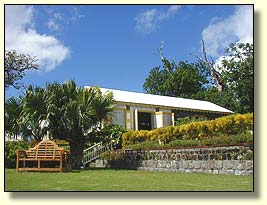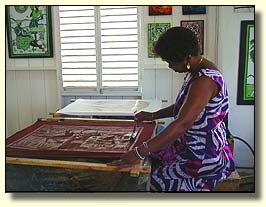| Home
Page
History & Culture
Admiral
Horatio Nelson
Points
of Interest
Brimstone
Hill Fortress
Basseterre
Nevis
Charlestown
Beaches
Activities
Diving
Fishing & Boating
Golfing
Eco-Adventures
Travel
Tips
Transportation
Accommodations
Restaurants & Nightlife
Calendar
of Events
Destination
Specialists
Best
Bets
Tourist
Offices
Geographia
|

St. Kitts & Nevis
Original Official Site of the
St. Kitts & Nevis
Department of Tourism
Exploring St. Kitts (Page2):
Brimstone Hill Fortress
By the late 18th century the sugar output
of St. Kitts & Nevis
was so high that the islands had become exceptionally prized--and
equally coveted. In order to defend their possessions, the British
built the enormous fortress of Brimstone Hill, a seemingly impregnable
bastion situated nearly 800 feet above the Caribbean and surveying
the waters all the way from St. Martin to Montserrat. In 1782,
with the arrival of a great French fleet, Brimstone Hill became
the site of one of the largest military conflicts in the Caribbean.
Today the fortress has been painstakingly restored; the view,
as always, is awe-inspiring.
Caribelle Batik
Located at Romney Manor, one of the island's most
attractive estate houses, is this local artisans' centre. Working
with locally-grown, exceptionally fine Sea Island cotton, the
artists produce tie-dyed batik and hand-painted creations of
all sorts.
 
Half Way Tree Village
Early in 1625, Thomas Warner's small colony greeted
the unexpected arrival of a French ship, probably in the shallow
bay on which Basseterre now sits. The French had suffered an
unfortunate encounter with a Spanish warship, and they limped
into St. Kitts in order to make much-needed repairs. The ship's
captain, Pierre Belain d'Esnambue, must have been favorably impressed
with what he found, as he returned shortly afterward with a small
group of colonists. Warner and the English, like the Caribs before
them, at first accepted the newcomers in friendship--or at least
toleration. In order to avoid later disputes, the two groups
of European colonists chose the great tamarind tree of Half Way
Tree Village to mark the border between the French and British
territories on St. Kitts. As the colonies grew and became increasingly
prosperous, this border was sorely tested. War was narrowly averted
during the first decade of the 18th century, for example, when
it was discovered that the tamarind had thrown out new roots--and
in theory extended to the British authority over many of the
village's French houses.
Bloody Point
By 1626 both the British and the French settlements
were expanding at such a rate that the Carib community began
to perceive a threat to its very existence on the island. Joining
forces with Caribs from a number of other islands, Chief Tegremare
prepared to attack the European settlements. In the meanwhile,
despite growing animosity between the French and the British,
the two communities aside their differences in order to mount
a combined, pre-emptive attack on the Carib. As a result, over
2,000 Carib Indians were massacred here at Bloody Point.
St. Kitts Sugar Factory
During the 18th century St. Kitts and Nevis were
among the finest jewels of the Caribbean sugar colonies, and
today on St. Kitts sugar is still a major crop. This modern factory,
which replaced the island's local stone sugar mills, is supplied
by means of a small highland railway circuit. St. Kitts sugar
is still renowned for its exceptional quality, and this sugar
factory also produces rum and Cane Spirits Rothschild (CSR),
a fine sugarcane liquor developed by Baron Edmond de Rothschild.
Carib Beer Brewery
By appointment only, visitors are offered with
both a tour and a complimentary tasting.
Exploring St. Kitts | Exploring
Nevis
Click here to
see what visitors are saying about interesting places in St.
Kitts & Nevis.
|
|




